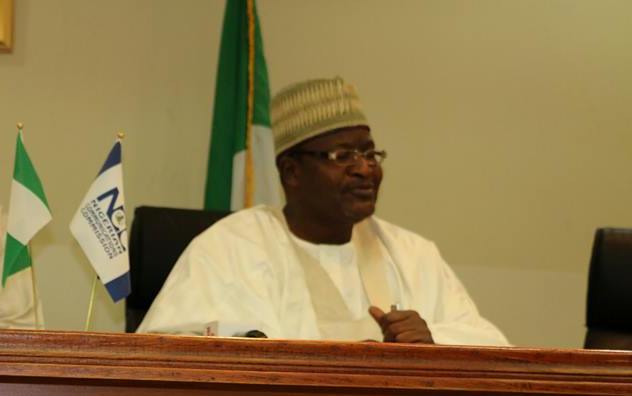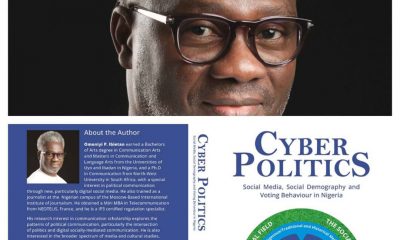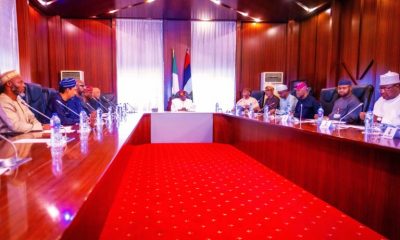NCC
NCC: A year’s account of a prof as CEO in business
Published
9 years agoon
By
Olu Emmanuel
Danbatta and telecommunications in Nigeria have a long history together. Little surprise the professor is carrying everything before him at NCC
By ELIJAH OLUSEGUN
IN the first 360 days of being in the saddle, Nigeria Communications Commission’s Executive Vice Chairman Umar Danbatta made some impressive runs. He grossed in N47 billion on spectrum sale; drove broadband penetration 20.95 percent deeper, internet, 47.44 percent; and he pulled in N30-billion investments in value added services to the sector.
And he’s only a professor–a trend-burster for that matter. Here’s the myth he just shattered: rocket scientists like Danbatta mostly don’t make good managers when they leave chalk-talks for sweaty field work as CEOs. That fib used to be popular until two researchers at the De Paul University, U.S., found out that among CEOs, non-business profs fare as well as business-professors, and even better than managers that boast only grit and gumption. “The performance of companies with executives who were professors at top-ranked business schools was the same as other companies with executives who were professors at non-ranked business schools,” said Bin Jiang and Patrick J. Murphy.
Danbatta is Nigeria’s example. Over a decade of teaching is no small time to sharpen one’s knowledge ordinarily. But the EVC flaunts 28 straight years developing expertise in seven core areas of ICT, including regulation, competition, strategies for universal access and service to telecommunications, spectrum management, new and emerging technologies impact, and others. His hands-on experience also spanned over a decade managing the Digital Bridge Institute of the NCC–as vice president–and participating in professional associations like the Chartered Organisation of Registered Engineers in Nigeria (COREN) and the Nigeria Society of Engineers (NSE).
So it was no big deal for him crystallising a number of policies he summed up in his Strategic Vision 2015-2020. They eventually spawned his eight-prong agenda when he took over last year. “It (the agenda) sets out the foundations for future growth and competitiveness that will be sustainable and inclusive and which would address our principal societal challenges as a nation,” said Danbatta in January.
Eight months after, almost all the eight points now have some scores to show. Take the re-farming out of spectrum for instance. Some small players on the 1800 megahertz have moved up, deploying services on the 4G/LTE band. “Through this, the commission has been able to revive some of the companies whose services have been hampered by the characteristics of the frequencies,” the EVC said last week while giving account of his first year in office.
To booth, he has firmed up the monitoring of this spectrum. According to him, the NCC recently deployed four spectrum analysers, leading to more efficiency in radio spectrum monitoring.” And the result? “More than N47 billion was realised in spectrum usage and licensing within the period under review,” he said.
ALSO SEE: NCC spends N10bn on emergency communication centres
As for regulations, the commission’s effort cuts across within the industry, and between telecos and consumers. With the Do Not Disturb (DND) directive, operators are stemming the rate of spamming consumers with unsolicited sms.
For the hawks among the operators, taking unfair advantage of smaller players is now difficult. While it approved of MTN acquiring Visafone, the NCC has yet to allow the Africa’s biggest teleco to start using Visafone’s spectrum. It’s the commission’s way of ensuring fair play.
And there’s so much that fair play, as an element of regulation, can do for the industry, apart from it dovetailing into seven other policies. Stability. Healthy competition. Growth. And others.
It’s obvious a lot of know-how and experience is stuffed into the agenda. But all that won’t be necessarily to the praise of Danbatta’s ingenuity. The EVC himself is keying into an agenda too sublime for industry watchers to chalk up to petty rivalry between EVCs.
He’s only out to make the commission a strategic player in national development, especially in the knowledge-driven economy now catching on everywhere around the world. “Wealth creation through application of human knowledge and creativity is steadily outpacing wealth creation through extraction and processing of natural resources,” he said early this year.
Well, you can take that from him as an ICT researcher, conference keynote speaker, technical adviser, and policy maker for about three decades.
Knowledge, he said, has clearly become the key driver of competitiveness, and is now reshaping the patterns of the world’s economic growth and activity.
For that reason, Danbatta has declared the policy goals of his administration will recognize the socio-economic importance of ICTs to national development. “And it therefore seeks to ensure that the infrastructure necessary to provide ubiquitous broadband services is available and accessible to all citizens at affordable rates,” he said.
The National Broadband Plan the last administration drew up targets 30 percent penetration by 2018. At about 21 percent currently, according to the International Telecoms Union (ITU) and the United Nations Educational, Scientific and Cultural Organisation (UNESCO), broadband still has a long way ahead.
But with the head start Danbatta gave the plan execution, the odds are high hitting the 30 percent mark is a piece of cake, and over 30 percent is a possibility.
You may like


Ibietan’s book on cyber politics for public presentation 25 July


Tinubu holds meeting with MTN Group Chairman, NCC Vice Chairman


NCC debunks reports on 5G network operation in Lagos


NCC speaks on fibre optic cable laying in Lagos, others


NCC dismisses reports linking 5G network to Coronavirus


NCC fines Airtel, 3 others N2.9bn over infractions
Trending

 Business1 week ago
Business1 week agoNaira mixed across markets as official window dips, parallel market strengthens

 Entertainment6 days ago
Entertainment6 days agoSinger Simi faces backlash after TikToker admits to false rape allegation

 Entertainment3 days ago
Entertainment3 days agoSimi addresses resurfaced 2012 tweets amid online backlash

 Latest1 week ago
Latest1 week agoTinubu defends electoral reform, downplays mandatory real-time upload

 Comments and Issues6 days ago
Comments and Issues6 days agoNigeria’s Declining Oil Output and Soaring Foreign Portfolio Investment Inflow

 Business6 days ago
Business6 days agoPENGASSAN warns Tinubu’s executive order on oil revenues could jeopardise 4,000 jobs

 Comments and Issues6 days ago
Comments and Issues6 days agoEx-prince Andrew’s arrest, lessons for Nigeria

 Health1 week ago
Health1 week agoNanoplastics may disrupt brain cells that control puberty, fertility, study finds

